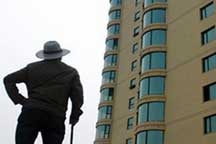4 cities begin reverse mortgage pilot program

 0 Comment(s)
0 Comment(s) Print
Print E-mail CNTV, July 3, 2014
E-mail CNTV, July 3, 2014
Four major cities -- Beijing, Shanghai, Guangzhou and Wuhan -- have started running a reverse mortgage pilot program, known as the house for pension scheme. It allows people aged above 60 to deed their houses to an insurance company or bank in exchange for a certain sum every month. The amount depends on the market value of the home and the owner’s life expectancy. But public reception has been cool.
Pension or property? It seems that most Chinese choose the latter.
"If we deed our house, what could our children inherit from us?"
"What if a person dies only days after signing the agreement? Will the insurance company compensate the family?"
"For those who don’t have children, house-for-pension is a good choice."
In China, the house is usually regarded as the root of a family. For many seniors, the house is their legacy for their children. A government official says the program is only a niche product.
"For old people who don’t have children, have property but lack cash, we offer them a choice to turn their fixed assets into current assets, to live more comfortably in their own home in their old age," Yao Yu with China Insurance Regulatory Commission said.
The program aims at tackling the rising pressure from the country’s greying population - 15 percent are above 60. But lack of a well rounded policy back-up means mounting questions -- the 70-year leasehold for real estate in China, the low valuation of client houses and that’s just the start.
"China faces an uncertain property market. Housing prices are fluctuating all the time. When the housing prices decline, how do we protect the interests of the insurance companies and the elderly? That’s one of the problems we need to solve," Professor Qin Qianhong with Wuhan University School Of Law said.
Previous similar programs in several cities have all fared badly. There are centuries of tradition to overcome and many uncertainties to be clarified if the plan it to succeed.





